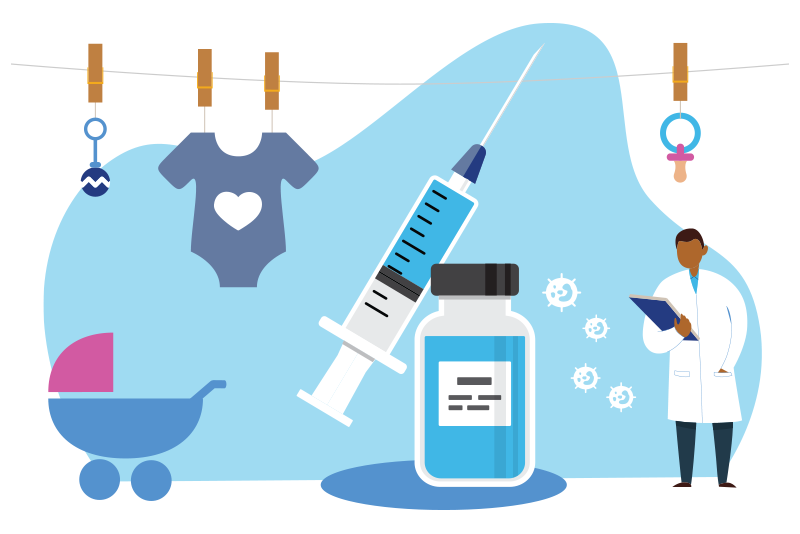A new vaccine formulation could finally protect babies against RSV

Though often mild, respiratory syncytial virus (RSV) infection can cause babies to be hospitalized with bronchiolitis or pneumonia. Globally, it is the leading cause of death in children under 5.
Several vaccines against RSV are being tested in adults. But there has been no progress on an RSV vaccine for children since 1966 — the year a candidate vaccine failed dramatically. That vaccine not only didn’t work, it caused an allergic-like response in the infants’ airways that made them sicker when they became infected.
“Pediatric RSV vaccine development halted,” says Dr. Simon van Haren, an immunologist in the Precision Vaccines Program at Boston Children’s. “We now know that infants’ immune systems are different from those in adults.”
Dr. van Haren, Precision Vaccines Program director Dr. Ofer Levy, and their colleagues had long been studying the unique features of newborns’ immune systems. They decided to reopen the case, exploring ways to stimulate immunity against RSV in newborns safely.
Their RSV vaccine formulation looks promising in early tests, inducing protective immune responses in newborn mice and in cells from human newborns. The scientists plan to work on it further and hope to eventually bring it to newborns worldwide.
Rethinking the RSV vaccine
Dr. van Haren and his colleagues began at the beginning. They studied white blood cells from newborns and the types of receptors that they carry. They then tried an array of potential adjuvants — extra ingredients to heighten the immune response — that might stimulate these receptors. The hope was that they would make vaccination more effective.
In 2016, they found two potential adjuvants that stimulated immune-cell receptors known as TLR7/8 and Mincle. Used together, they provoked robust responses in newborns’ antigen-presenting cells. These immune cells are key to kickstarting a wider immune response.
Most notably, the adjuvants strongly activated type 1 T-helper (Th1) responses, which are essential in defending against viruses. These responses have been hard to stimulate in newborns. In fact, a major reason the earlier RSV vaccine failed was that it did not produce a Th1 response.
In collaboration with scientists at the Statens Serum Institut in Copenhagen, Denmark, the team packaged the two adjuvants inside fatty particles called liposomes. They then added the particles to a key protein in RSV, thereby creating a new RSV vaccine.
Putting the combination to the test
The first stop in testing the new vaccine formulation was, again, antigen-presenting cells, which the team was able to obtain from newborns’ donated cord blood. Led by Dr. Hanno Steen at Boston Children’s, the researchers profiled the cells’ responses using a cutting-edge technique called phosphoproteomics. They saw a robust immune response, including enhanced production of cytokines — signaling molecules that rally a wider immune response — by Th1 cells.
These benefits, reported August 2 in Nature Communications, appear to be unique to newborns. The vaccine-adjuvant combination did not induce the same Th1 immune responses in blood cells of human adults. Nor did it in adult mice.
“Dr. Steen’s group helped us understand why our adjuvant combination works so well in children and less so in adults,” says Dr. van Haren. “It lays out the requirements for a vaccine formulation to work in early life.”
Promising protection against RSV in mice
When the scientists tested the formulation in newborn mice, it protected the animals against a direct challenge with RSV, with no evidence of any harm. It induced both Th1 cells and CD8+ T cells (also important in inducing broader immune responses) that specifically recognized RSV, as well as antibodies capable of neutralizing the virus.
The next step will be to refine the formulation and test it in larger animals. If all goes to plan, Drs. van Haren and Levy hope to enter it in clinical trials.
“This adjuvant combination is tailored to be effective in early life,” says Dr. Levy. “As adjuvants can be added to a range of vaccines to make them work better, we hope this combination will eventually enhance vaccination of infants against not only RSV, but also influenza, coronaviruses, and other serious infections.”
Related Posts :
-

Study highlights the severity of acute necrotizing encephalopathy in kids with the flu
For most children, influenza (flu) usually means unpleasant symptoms like a fever, sore throat, and achy muscles. But for a ...
-

No limitations: How Flora found answers for MOG antibody disease
Flora Ringler’s fifth birthday didn’t turn out as she had hoped. She and her family were vacationing in ...
-

What orthopedic trauma surgeons wish more parents knew about lawnmower injuries
Summer is full of delights: lemonade, ice cream, and fresh-cut grass to name a few. Unfortunately, the warmer months can ...
-

Partnering diet and intestinal microbes to protect against GI disease
Despite being an everyday necessity, nutrition is something of a black box. We know that many plant-based foods are good ...





